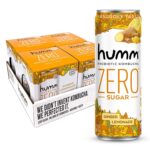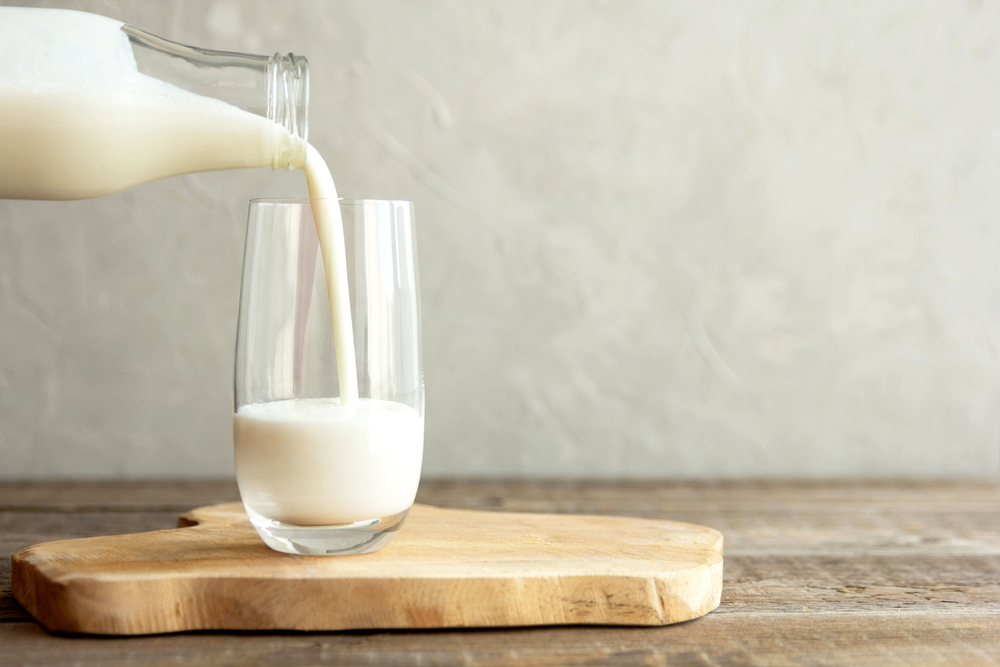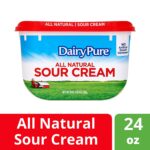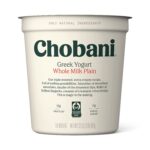Kefir is a drink made from the fermented milk of a cow, goat, or sheep. This fermented drink has become a popular beverage for supporting digestive health. It has a thin consistency with a slightly sour flavor. This product contains dozens of unique species of probiotics that are known to improve gut health and aid in digestion. Most brands of kefir are lactose-free and low in sugar. With all that being said, is kefir also keto-friendly?
Yes, kefir can be consumed while following a ketogenic diet as it is low in carbs. The optimal keto diet consists of approximately 60% fat, 30% protein, and 10% carbohydrates. The best keto alternatives to kefir include cultured Friendship Dairies Cultured Buttermilk, Chobani Whole Milk Plain Greek Yogurt, and Dairy Pure & Natural Sour Cream.
In this article, we will go over the health benefits of kefir, how it is made, its nutritional information, as well as the nutritional content of other keto alternatives. Let’s dive in!
Contents
What is Kefir?
Kefir is a cultured, fermented beverage similar to kombucha. Kefir is made similarly to the process of sourdough bread. A kefir starter, such as yeast and bacteria is used to begin the fermentation process of dairy milk. Kefir is most commonly made from dairy milk, however, coconut milk or coconut water may be used.
Since kefir is fermented, individuals with lactose intolerance tend to be able to handle it. This is because most of the lactose is broken down during the fermentation process. Kefir has a similar flavor to yogurt but is not as thick. It is also not as runny as regular milk. You will usually find it in the same section as yogurts in the grocery store.
How Is Kefir Keto?
On average, an 8 oz serving of kefir made from milk contains around 10-12 grams of carbs per serving. Since most people following the keto diet consume around 25-50 grams of net carbs per day, kefir can fit into this threshold. It is important to consume a majority of those allotted carbs from vegetables, but including kefir from time to time can offer many benefits. There are also kefir drinks that are made from coconut water that contain the same carbohydrate content, but they have zero fat or protein.
Is Kefir Healthy?
Kefir is packed with nutrients, vitamins, and probiotics, making it a great addition to almost any diet. Kefir contains around 50 different strains of probiotics that are linked to many beneficial health outcomes. Our bodies contain millions of different types of bacteria, both good and bad. But, good bacteria are the probiotics. They help our bodies digest food, improve immunity, and they even play a role in mental health. Kefir’s micronutrient content is also impressive. It contains B vitamins, vitamin C, vitamin K, folate, phosphorus, potassium, magnesium, and calcium. Some other health benefits associated with kefir include:
- Antibacterial properties
- Improve bone health and reduce the risk of osteoporosis
- Improve digestion and minimize symptoms of IBS
- Treat yeast infections, such as an overgrowth of candida
- Boost immunity
- Improve allergy and asthma symptoms
- May fight cancer-causing free radicals
Can I Make Kefir At Home?
You can always buy kefir at your local grocery store, but why not try and make your own at home? All you need are live starter cultures, plus a dairy or coconut water-based medium. Check out this easy homemade kefir recipe:
You will need:
- 1 Kefir starter pack
- 4 cups raw coconut water or milk
- 1-quart size mason jar
- Candy thermometer
- Cheesecloth or coffee filter
- Rubber band for sealing
Instructions:
- Bring milk or coconut water to room temperature or heat it just until it reaches 70 degrees F.
- Pour warm milk into a mason jar and add the kefir starter packet. Stir with a wooden spoon to incorporate the ingredients.
- Cover mason jar with a coffee filter or cheesecloth and secure with a rubber band.
- Let the mixture ferment for 14-16 hours in a warm spot with a temperature of at least 72-74 degrees F.
- After the mixture develops a sour yogurt-like flavor, cover with a lid and refrigerate. Dairy milk-based kefir should be the consistency of pourable yogurt while coconut water kefir should be slightly cloudy with a sour, tangy flavor.
How to use: Kefir can be enjoyed in smoothies, overnight oats, salad dressings, poured over fruit, or even all by itself. Do not cook the kefir or it will destroy the beneficial organisms. Keep covered in the fridge for up to 2 weeks,
Kefir Nutritional Information
There are two types of kefir available. The first is the traditional kefir made from dairy milk, or it can be made from coconut water. Let’s explore the two of them.
Lifeway Kefir
Ingredients:
- Pasteurized Lowfat Milk
- Nonfat Milk
- Pectin
- Vitamin A Palmitate
- Vitamin D3
- Live And Active Cultures
Nutrition Facts (per 1 cup):
- Calories: 110
- Total Fat: 2g
- Saturated Fat: 1.5g
- Cholesterol: 10mg
- Sodium: 125mg
- Total Carbohydrate: 12g
- Fiber: 0g
- Total Sugars: 12g
- Protein: 11g
Thirty-Two Degrees Coconut Water Kefir
This brand of coconut kefir water contains 15-30 billion probiotic cultures per 2 oz serving. It is also packed with the same abundance of nutrients found in plain coconut water.
Ingredients:
- Water
- Cane Sugar
- Dates
- Concentrated Lemon Juice
- Natural Coconut Aroma
- Lactococcus Strains
- Lactobacillus Strains
- Bifidobacterium Strains
Nutrition Facts (per 1 cup):
- Calories: 48
- Total Fat: 0g
- Saturated Fat: 0g
- Cholesterol: 0mg
- Sodium: 0mg
- Total Carbohydrate: 12g
- Fiber: 0g
- Total Sugars: 12g
- Protein: 0g
Other Keto Alternatives to Kefir
Sour Cream
Full fat sour creams are another fermented dairy product and a great keto alternative to kefir. They also contain a higher fat and lower carb content, which is ideal for the ketogenic diet. It has a lower fermentation process so the flavor is less acidic than kefir.
It is important to always choose natural, full-fat sour creams, as light or fat-free varieties tend to have added sugars.
Dairy Pure & Natural Sour Cream
- Cultured Cream
Nutrition Facts (per 2 Tablespoons):
- Calories: 60
- Total Fat: 5g
- Saturated Fat: 3.5g
- Cholesterol: 20mg
- Sodium: 15mg
- Total Carbohydrate: 1g
- Fiber: 0g
- Total Sugars: 1g
- Protein: 1g
Whole Milk Greek Yogurt
Plain greek yogurt that is made from whole milk is a fantastic substitution for kefir. Plain greek yogurt is fermented and has a similar sour taste to kefir. It is also a good source of fat, is low in carbs, and is an excellent protein source. There are also live and active probiotic cultures in every bite!
It is important to always choose the plain flavor when selecting yogurt because the other fruity varieties contain tons of sugar that will surely kick you right out of ketosis.
Chobani Whole Milk Plain Greek Yogurt
- Cultured Milk
Nutrition Facts (per ¾ cup):
- Calories: 686
- Total Fat: 9g
- Saturated Fat: 5g
- Cholesterol: 35mg
- Sodium: 60mg
- Total Carbohydrate: 7g
- Fiber: <1g
- Total Sugars: 4g
- Protein: 16g
Cultured Buttermilk
Cultured buttermilk has 20% fewer calories than regular buttermilk and is also a great source of calcium, vitamin A, vitamin D, and active cultures. Buttermilk is also just as thick as kefir and would work as a good substitute in recipes.
Friendship Dairies Cultured Buttermilk
Ingredients:
- Cultured Reduced Fat Milk
- Nonfat Milk
- Vitamin A Palmitate
- Vitamin D3, Enzyme
Nutrition Facts (per ¾ cup):
- Calories: 68
- Total Fat: 9g
- Saturated Fat: 5g
- Cholesterol: 35mg
- Sodium: 60mg
- Total Carbohydrate: 7g
- Fiber: <1g
- Total Sugars: 4g
- Protein: 16g
Sugar-Free Kombucha
Kombucha, also known as mushroom tea, is another fermented beverage that has a wide variety of bacterial cultures. Most traditional kombucha drinks contain around 10 grams of sugar per serving, but this brand below is sugar-free, as the sugar is completely eliminated during the fermentation process. This refreshing probiotic drink will keep you in your state of ketosis.
Humm Probiotic Kombucha – Ginger Lemonade
 Humm zero sugar kombucha is available in six deliciously refreshing flavors.
Humm zero sugar kombucha is available in six deliciously refreshing flavors.
Ingredients:
- Organic Raw Carbonated Kombucha (Filtered Water, Organic Green Tea, Organic Black Tea, Organic White Grape Juice*, Organic Cane Sugar*, Live Kombucha Cultures)
- Allulose Syrup**
- Monk Fruit**
- Organic Ginger Juice
- Natural Flavors**
- Probiotic: Bacillus Subtilis
- Vitamin B12 (Mecobalamin)
*Sugar Is Eliminated During Fermentation. **From Plant-Based Ingredients
Nutrition Facts (per 1 can, 330ml):
- Calories: 10
- Total Fat: 0g
- Saturated Fat: 0g
- Cholesterol: 0mg
- Sodium: 0mg
- Total Carbohydrate: 10g
- Fiber: 0g
- Total Sugars: 0g
- Protein: 0g
Related Questions
Is Kefir Dairy-Free?
Traditional kefir made from cow, goat, or sheep milk is not dairy-free. However, it is low in lactose because of the fermentation process. This makes it tolerable for some individuals with lactose intolerance. If you are looking for a dairy-free form of kefir, you can purchase coconut water kefir or you can make your own kefir drink at home with coconut milk.
Is Kefir Paleo?
Kefir is not considered paleo certified because non-human dairy was not consumed during Paleolithic times. Some paleo followers argue that kefir is “paleo-friendly” because of its vast amount of health benefits. An alternative paleo option would be to consume coconut water kefir or coconut milk kefir. These are both non-dairy and are still packed with beneficial live cultures.
Is Kefir Gluten-Free?
Kefir is gluten-free. Kefir starter grains are made up of sugar, lipids, and proteins. Unlike rice-wheat grains, kefir grains don’t contain any gluten. Some brands may use non-gluten-free oats in their kefir products so be sure to read labels.


